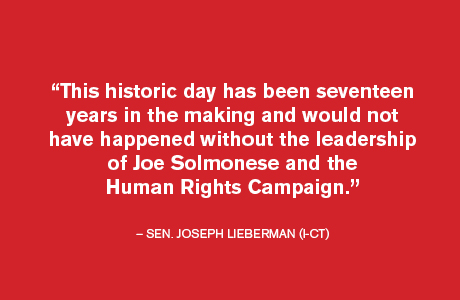
A Code Pink protester holds a sign asking for the repeal of the “Don’t Ask, Don’t Tell” policy during the Senate Arms Services Committee hearing on the Pentagon’s report’s findings on the policy on Capitol Hill in Washington December 2, 2010. REUTERS/Kevin Lamarque (UNITED STATES – Tags: POLITICS MILITARY)
The discriminatory “Don’t Ask, Don’t Tell” ban on gay and lesbian service members is officially in the dustbin of history. For 17 years, the law prohibited qualified gay and lesbian Americans from serving in the armed forces and sent a message that discrimination was acceptable.
A new chapter now begins for the nation’s military. Gay and lesbian service members previously discharged under DADT have the opportunity to re-enlist. Gay and lesbian Americans eager to serve the country but not willing to compromise who they are as individuals will, for the first time ever, be able to openly join. And brave men and women currently serving will have the freedom to come out and be honest with their comrades about who they are and who they love.
HRC members and supporters played a critical role in getting us here. You sent over 625,000 e-mails to your members of Congress urging them to support repeal. You helped us gather nearly 50,000 handwritten pro-repeal messages for delivery to Capitol Hill. And you supported our efforts in states across the country, lobbying your elected officials and engaging with the 20,000 veterans HRC mobilized to speak out in favor of repeal.
Learn more about HRC’s critical role in ending DADT.

Where We Go From Here
Despite this milestone, there is important work to ensure meaningful implementation of repeal and full equality for gay and lesbian service members.There are several actions that are crucial to continuing down the path of full equality:
- Opposing discriminatory legislative actions brought by anti-LGBTQ lawmakers
- Supporting the Respect for Marriage Act as a means of ending the discriminatory DOMA law
- Providing oversight of military personnel decisions related to DADT repeal, particularly as they pertain to the extension and fair application of benefits
- Reviewing the barriers to transgender individuals serving in the military
- Repeal Article 125 of the Uniform Code of Military Justice, which criminalizes intimacy between same-sex couples
Learn more about what advocates for equality can do moving forward.

Read President Obama’s statement on DADT repeal
Read HRC’s statement on the end of DADT
Read quotations from military leaders supporting repeal
Learn more about the “Voices of Honor” tours and campaign
